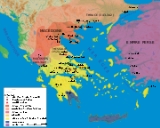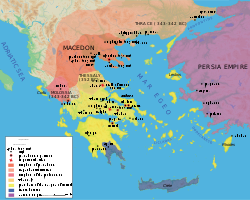
League of Corinth
Encyclopedia

Philip II of Macedon
Philip II of Macedon "friend" + ἵππος "horse" — transliterated ; 382 – 336 BC), was a king of Macedon from 359 BC until his assassination in 336 BC. He was the father of Alexander the Great and Philip III.-Biography:...
during the winter of 338 BC
338 BC
Year 338 BC was a year of the pre-Julian Roman calendar. At the time it was known as the Year of the Consulship of Camillus and Maenius...
/337 BC
337 BC
Year 337 BC was a year of the pre-Julian Roman calendar. At the time it was known as the Year of the Consulship of Longus and Paetus...
after the Battle of Chaeronea
Battle of Chaeronea (338 BC)
The Battle of Chaeronea was fought in 338 BC, near the city of Chaeronea in Boeotia, between the forces of Philip II of Macedon and an alliance of Greek city-states...
, to facilitate his use of military forces in his war against Persia. The name 'League of Corinth' was coined by modern historians after the first council of the League in Corinth. It was the first time in history that all the Greek states (with the notable exception of Sparta
Sparta
Sparta or Lacedaemon, was a prominent city-state in ancient Greece, situated on the banks of the River Eurotas in Laconia, in south-eastern Peloponnese. It emerged as a political entity around the 10th century BC, when the invading Dorians subjugated the local, non-Dorian population. From c...
) managed to became part of a single political entity.
Organization
The League was governed by the Hegemon (strategos autokrator in a military context), the Synedrion (council) and the Dikastai (judges). Decrees of the league were issued in Corinth, Athens, Delphi, Olympia and PydnaPydna
Pydna was a Greek city in ancient Macedon, the most important in Pieria. Modern Pydna is a small town and a former municipality in the northeastern part of Pieria regional unit, Greece. Since the 2011 local government reform it is part of the municipality Pydna-Kolindros, of which it is a...
. The League maintained an army levied from member states in approximate proportion to their size, while Philip garrisoned phrourarch
Phrourarch
Phrourarch or Phrourarchos is a Greek military title, meaning garrison commander. Athenians controlled their overseas empire with the episcopi and phrourarchs . The term was widely used by the Macedonian and later Hellenistic armies. Regarding the Spartans, it is not clear if phrourarch was the...
s in Corinth, Thebes, and Ambracia
Ambracia
Ambracia, occasionally Ampracia , was an ancient Corinthian colony, situated about 7 miles from the Ambracian Gulf in Greece, on a bend of the navigable river Arachthos , in the midst of a fertile wooded plain.-History:...
.
Text
Translation
The League during the Alexandrian campaigns
The decision for the Destruction of Thebes as transgressor of the above oath was taken by the council of the League of Corinth by a large majority. The League is mentioned by ArrianArrian
Lucius Flavius Arrianus 'Xenophon , known in English as Arrian , and Arrian of Nicomedia, was a Roman historian, public servant, a military commander and a philosopher of the 2nd-century Roman period...
(I, 16, 11), after the battle of Granicus (334 BC). Alexander sent 300 panoplies to the temple of Pallas Athena in Athens, with the following inscription. In 331 BC after the battle of Megalopolis
Battle of Megalopolis
The Battle of Megalopolis was fought in 331 BC between Spartan led forces and Macedonia. Alexander's regent Antipater led the Macedonians to victory over King Agis III.-Background:...
, Sparta was forced to join the League of Corinth. During the Asiatic campaign, Antipater
Antipater
Antipater was a Macedonian general and a supporter of kings Philip II of Macedon and Alexander the Great. In 320 BC, he became Regent of all of Alexander's Empire. Antipater was one of the sons of a Macedonian nobleman called Iollas or Iolaus and his family were distant collateral relatives to the...
was appointed deputy hegemon of the League.
Aftermath
The League was dissolved after the Lamian WarLamian War
The “Lamian War”, also referred to as the “Hellenic War” and the “War against Antipater”, was fought by the Athenians and their Aetolian, Locrian, and Phocian allies against the Macedonians in Thessaly during the winter of 323–322 BC...
(322 BC). In 302 BC Antigonus and his son Demetrius Poliorcetes tried to revive the federation against Cassander
Cassander
Cassander , King of Macedonia , was a son of Antipater, and founder of the Antipatrid dynasty...
. Antigonus III Doson
Antigonus III Doson
Antigonus III Doson was king of Macedon from 229 BC to 221 BC. He belonged to the Antigonid dynasty.-Family Background:He was a grandson of Demetrius Poliorcetes and cousin of Demetrius II, who after the latter died in battle and rescued Macedonia and restored Antigonid control of Greece...
also revived the League against Sparta
Sparta
Sparta or Lacedaemon, was a prominent city-state in ancient Greece, situated on the banks of the River Eurotas in Laconia, in south-eastern Peloponnese. It emerged as a political entity around the 10th century BC, when the invading Dorians subjugated the local, non-Dorian population. From c...
.
See also
- KoinonKoinonKoinon , meaning "common" and interpreted as "commonwealth", "league" or "federation" were a number of associations of cities in ancient and early modern Greek history. The various federations termed Koinon were:...
- Hellenic League (disambiguation)
- Macedonia (ancient kingdom)

